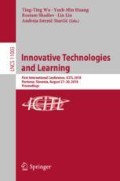Abstract
Internet of Thing (IoT) programming requires a well algorithm design and systematic process of solving the problem, which will lead to efficient production. This research, adopted the principles of problem solving approach are applied problem solving and programming problem solving to encourage students to solve the programming problems for effectively designing new innovation or smart things from internet of thing devices. This research was to synthesis of designing framework for constructivist learning environments model to enhancing programming problem solving for connecting internet of thing devices. The model research: design and development process was employed in this study in phase I: statistic methods are document analysis, and survey. The procedures were as following: (1) synthesizing the theoretical framework and (2) synthesizing the designing framework. The result revealed that: (1) The designing framework comprises of: (1) Problem base, (2) Resources, (3) Cognitive Tools, (4) Collaboration, (5) Programming problem solving center, (6) Scaffolding, and (7) Programming Coaching Room. (2) The efficiency of this theoretical framework and designing framework were evaluated by expert review. They were found the theoretical framework and designing framework of learning environment are appropriate on instructional design.
Access this chapter
Tax calculation will be finalised at checkout
Purchases are for personal use only
References
Partnership for 21st Century Learning (P 21). Framework for 21st Century Learning (2009). http://www.p21.org/our-work/p21-framework. Accessed 3 Nov 2017
Jayavardhana, G., Rajkumar, B., Slaven, M., Marimuthu, P.: Internet of Things(IoT): a vision, architectural elements, and future directions. Fut. Gener. Comput. Syst. 29(7), 1645–1660 (2013)
Madakam, S., Ramaswamy, R., Tripathi, S.: Internet of Things (IoT): a literature review. J. Comput. Commun. 3, 164–173 (2015)
Dale, N.B., Weems, C.: Programming and Problem Solving with Java. Jones & Bartlett Learning (2007)
Jonassen, D.H.: Instructional design model for well-structured and ill-structured problem-solving learning outcomes. Educ. Tech. Res. Dev. 45(1), 65–95 (1997)
Richey, R.C., Klein, J.D.: Design and Development Research: Methods, Strategies, and Issues. Routledge, New York (2007)
Piaget, J.: The Equilibration of Cognitive Structures: The Central Problem of Intellectual Development. University of Chicago Press, Chicago (1985)
Brown, J.S., Collins, A., Duguid, P.: Situated cognition and the culture of learning. Educ. Res. 18(1), 32–43 (1989)
Hannafin, M.: Open Learning Environments: Foundation, Method, and Models. In Charles, New Jersey (1999)
Klausmeier, H.J.: (Information Processing Theory) (1985). http://www.oknation.net/blog/print.php?id=132965. Accessed 13 May 2015
Mayer, R.E. (ed.): The Cambridge Handbook of Multimedia Learning. Cambridge University Press, New York (2005)
Vygotsky, L.: Thinking and Speaking. MIT Press, Cambridge (1962)
Chijaroen, S.: Education Technology: Principles, Theories, and Implementation. Anna Ofset, Khon Kaen (2014)
Samat, C., Chaijaroen, S., Kanjug, I., Vongtathum, P.: Design and development of constructivist multimedia learning environment enhancing skills in computer programming. In: Proceedings - 2017 6th IIAI International Congress on Advanced Applied Informatics, IIAI-AAI 2017, Japan (2017)
Acknowledgement
This work was supported by the Academic and Research Affairs, Innovation and Cognitive Technology Research Group, Faculty of Education, and the Research and Technology Transfers Affairs Division, Faculty of Education, Khon Kaen University.
Author information
Authors and Affiliations
Corresponding author
Editor information
Editors and Affiliations
Rights and permissions
Copyright information
© 2018 Springer Nature Switzerland AG
About this paper
Cite this paper
Moeikao, N., Samat, C. (2018). Synthesis of Designing Framework for Constructivist Learning Environments Model to Enhancing Programming Problem Solving for Connecting Internet of Thing Devices. In: Wu, TT., Huang, YM., Shadiev, R., Lin, L., Starčič, A. (eds) Innovative Technologies and Learning. ICITL 2018. Lecture Notes in Computer Science(), vol 11003. Springer, Cham. https://doi.org/10.1007/978-3-319-99737-7_26
Download citation
DOI: https://doi.org/10.1007/978-3-319-99737-7_26
Published:
Publisher Name: Springer, Cham
Print ISBN: 978-3-319-99736-0
Online ISBN: 978-3-319-99737-7
eBook Packages: Computer ScienceComputer Science (R0)

